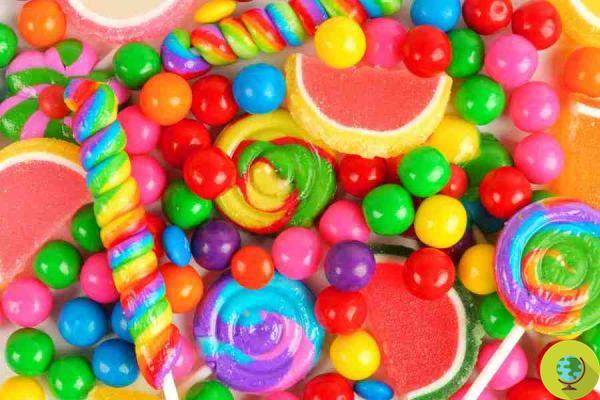
EFSA updates the safety assessment of titanium dioxide following a request from the European Commission in March 2020.
Don't store avocado like this: it's dangerousUsed as a whitener in sweets and candies, but also in many baked goods, broths and ready-made baby sauces, as well as spreads and processed nuts, titanium dioxide, also known as E171 or TiO2, is an additive food (still in use) that can no longer be considered safe. The opinion of EFSA finally arrives, now we only need a law at European level.
After France had already decided to temporarily ban it, the European Food Safety Authority is now updating its titanium dioxide safety assessment following a request from the European Commission in March 2020.
The new assessment revised the results of the previous EFSA assessment published in 2016, which highlighted the need for further research to fill some gaps in the data.
“Taking into account all available scientific studies and data, the scientific panel concluded that titanium dioxide can no longer be considered safe as a food additive. A key element in reaching this conclusion is that we could not rule out genotoxicity concerns related to the ingestion of titanium dioxide particles. After ingestion the absorption of titanium dioxide particles is low, however they can accumulate in the human body, ”says Maged Younes, chair of the EFSA Expert Group on Food Additives and Flavorings (FAF Panel).
The evaluation was conducted by taking into account several thousand studies that emerged since the previous Efesa 2016 evaluation, including new scientific evidence and data on nanoparticles and applying for the first time the 2018 EFSA Scientific Committee Guide on Nanotechnology to the evaluation of safety of food additives. Titanium dioxide (E 171) contains a maximum of 50% of particles in the nano range (i.e. less than 100 nanometers) to which consumers may be exposed.
Evaluation of genotoxicity
Genotoxicity is the ability of a chemical to damage DNA, the genetic material of cells. As genotoxicity can have carcinogenic effects, it is essential to assess the potential genotoxic effect of a substance to draw conclusions on its safety.
"Even if the evidence of toxic effects was generally not conclusive, on the basis of new data and even more robust methods we could not rule out fears of genotoxicity and, consequently, we could not establish a safety level for daily intake. of this food additive, "explains Matthew Wright, member of the FAF Scientific Panel and Chair of the EFSA Working Group on E171
Risk managers at the European Commission and EU Member States have been informed of EFSA's conclusions and will reflect on the appropriate measures to be taken to ensure consumer protection, the note reads.
Source: EFSA
Read also:- Carcinogenic titanium dioxide in most of the masks analyzed, the complaint of Adiconsum Veneto
- Titanium dioxide: "carcinogenic by inhalation", from February on the label on products containing it
- E171: Mars, Lindt and Haribo say enough to use the titanium dioxide dye in nano-particles
- 2 out of 3 toothpastes contain titanium dioxide, a possible carcinogen. The French analysis


























